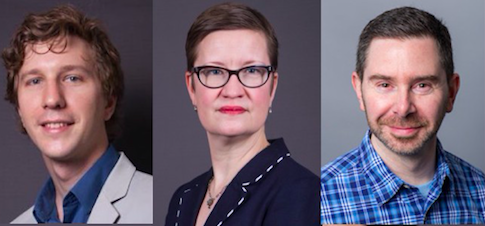
It was 1945 when Oma saw an orange for the first time. The jubilee of being able to hold one and soon consume the juicy deliciousness of it overpowered the menial details of how she’d go about it. She decided to chomp into it like an apple, peel and all. After all, she’d had no experiences with oranges that would inform her of any other way.
This story is one of many that SUNY New Paltz’s english professor and director of creative writing Kristofer Jansma has learned of his grandmother Oma’s life as she lived through the Hunger Winter in post-World War II Holland. In 1944, Nazis blocked the transportation of food to the Netherlands leading to a year-long famine, resulting in the death of roughly 20,000 Dutch people. Oma says if the war were to last just one week longer, she and those around very well may have starved to death.
When allies finally began to drop food in May of 1945, Oma remembers running out to where the food was supposed to be dropped off with a huge pillowcase to carry as much as she could. Families across Holland had set out their nicest silverware to prepare for the meals they would finally be able to eat. But all that was there was delivered for a while was saltine crackers, then bread and butter. It took awhile before Oma saw her first real meal and then her first orange.
Since the pandemic began, Jansma has had weekly check-ins with his grandmother. As he talked about how he was dealing with the pandemic, Oma drew connections between the pandemic and the Hunger Winter..
“My mindset was just to keep my head down… and hope that a year or two from now it’s all going to be a distant memory and my kids will feel like it was just a bad dream,” Jansma explained. At the time, his children were just four and eight years old.
“You should expect that not only will children remember, but there will be some lasting effects,” his grandmother explained to him.
“What do you mean by that?” Jansma asked her.
She explained that she was around the age his children are when she lived through the Second World War and she was still highly impacted. In fact, her earliest childhood memory is standing in her kitchen watching through the windows as planes flew overhead.
“De oorleg begint,” her father said. He was saying: “the war is beginning.”
At age 16, she couldn’t bear the sound of fireworks because they triggered flashbacks to wartime and caused PTSD episodes.
This is the dialogue that birthed her and Jasma’s regular conversations about what it was like to live through WWII which he then shared with the New Paltz campus.
On March 2, the College of Liberal Arts and Sciences hosted a panel about trauma and coping during the pandemic as part of a flagship “Without Limits” series. The series aims to host interdisciplinary panelists to come together and give input on a given topic in order to “make connections among the many aspects of liberal arts” and to “investigate the meaning and role of liberal education in the twenty-first century.” The 2020-2021 theme is, “The End of the World As We Know It?” which will explore “inequality, injustice and trauma during the COVID-19 crisis.”
The trauma and coping panel also featured Karla Vermeulen, the Deputy Director of the Institute for Disaster Mental Health and an associate professor of psychology. Vermeulen tackled how the pandemic impacted emerging adults (ages 18-29) in a presentation entitled, “Welcome to Adulthood!: Coming of Age During A Pandemic.”
Using a multitude of research, Vermeulen argued that the pandemic was one more form of trauma for a generation that was already dealing with the threat of school shootings, climate change, student loan debt, racial injustice and other disasters. “Yet they’re fighting to continue their education and to take on adult responsibilities, demonstrating a collective level of resilience we should all respect,” she explains.
The final panelist was Jonathan D. Raskin, the chair of the department of psychology, a professor of psychology and counselor education, and a licensed psychologist who has a private practice.
Raskin’s section explored how looking at the pandemic through the different contexts of mind and self could be a useful guide to coping with it. The mind is a person’s defensive and protective reactions to a potential threat. The self, on the other hand, is more focused on human connections and growth. While the mind will blame, the self will take responsibility; while the mind avoids what is challenging out of fear of rejection and failure, the self seeks to master what is difficult.
The mind is “a magnificent instrument of protection, always on the job and cleverly inventing scenarios of doom and gloom,” Raskin explained. “Here’s the paradox: the more that you let [the mind] be, the more space there is for the self to be heard.”
He encourages allowing self-indulgence and self-pity before moving onto high spirits and cheer, because not doing so would be “putting the cart before the horse.” Raskin illustrated that allowing yourself to feel difficult emotions instead of trying to force positivity leads to stronger growth and more sustained joy.
Dr. Raskin ended with a quote by Rainer Marie Rilke, a German poet, that was featured at the end of the movie Jojo Rabbit, which takes place in Nazi, Germany. “Let everything happen to you: beauty and terror,” it reads. “Just keep going. No feeling is final.”

